How Much Does It Cost to Ceramic Wrap a Car
There is an old saying – "if cost wasn't an issue, I'd buy it immediately." Unfortunately, cost is usually the most important factor. This is especially true with products for maintaining our prized rides – like wondering if ceramic coatings are worth the investment?
The cost of ceramic coating can vary significantly. From the professionally applied coatings to a DIY coating, you've got multiple options to consider. And for most car owners, it breaks down to cost.
That's what we'll dive into with this article. In today's AvalonKing blog, we'll discuss ceramic coating for your car and definitively answer the question of whether it's worth it to most consumers.
Factoring the Cost of Ceramic Coating

Most consumers opt for automotive ceramic coatings because they are looking for a longer-lasting, higher-quality paint protection product, but don't want to spend the money to have a professional apply them.
When you look at the financial cost of ceramic coatings for cars, there is a smart reason for this. There are generally two grades of auto ceramic coatings, the professional-grade, and DIY grade.
The professional products are made by manufacturers and only sold to certified or approved application experts. Most of the time, these folks operate paint detailing companies, vinyl wrap or PPF businesses, or custom auto body shops.
The ceramic pro-grade products are sold individually, as a commercial-grade type product. They are not sold to the general public with DIY kits, as they require special equipment and techniques to apply correctly.

When you visit a professional installer, you'll have package options to consider. The packages are based on 'years of protection' or 'guaranteed years of protection'. This image above explains some of the popular packages offered by ceramic pro installers.
The price for professional-grade coatings can range from $600 to $3,000. But, that's usually just the coating itself. Prep work such as paint correction is often much more and required for the guarantees to be effective.
The DIY Coating comes in a complete installation kit. The cost ranges based on the size of the vehicle, and the level of prep work needed. But, overall, the do-it-yourself coating is a significantly reduced financial investment.
With that in mind, here are some of the pros and cons of each option to consider.
PROS OF CERAMIC PRO INSTALLATION
- The Minimalist Option: When you have the pro installer complete this project for you, it's the ultimate minimalist effort. Simply drop off the vehicle and pick it up when they are done.
- Different Warranty Options: The ceramic pro option comes with multiple levels of warranty options. Consumers can opt for the warranty grade that fits their needs and budgets best.
- Superior shine: Professional nanoceramic coatings often produce elegant shine and hydrophobic properties.
CONS OF CERAMIC PRO INSTALLATION
- Expensive: Comparing ceramic pro products to DIY isn't really fair, but it's a reality. Most of these packages range from $1,000 to $2,500 based on the product, how many applications, and years of protection.
- Questionable Warranties: Some pro installers are better than others. Always verify the facts and terms of any warranty – and get it in writing before opting for the pro-grade.
- Extra upkeep requirements: Most of the professional-grade coatings require the use of specific paint protection or upkeep products, or monthly – semi-annual visits to their facility for detailing, which cost extra.
PROS OF DIY CERAMIC COATINGS
- Less Costly: It's estimated that a high-quality DIY nano-ceramic coating will cost about 90% less than the best ceramic pro option.
- Superior Hydrophobic Properties: DIY ceramic coatings can produce exceptional shine and hydrophobic properties.
- Similar length of service: On average, the professional and DIY products offer the same level of protection for the same length of time.
- You feel better about doing it yourself: Well, this is the primary reasons why consumers opt for the DIY solution.
CONS OF DIY CERAMIC COATINGS
- It takes effort to prep the vehicle: Positive results are typically generated based on the prep work completed. The quality of your paint surface will mainly determine how much prep work will be required.
- Not for all cars: If your paint's clear coat is thin, a DIY ceramic coating is not going to help much. It's really intended for newer cars with quality clear coat finishes.
- Some really cheap products on the market: The DIY coating segment is packed with inferior products with over-exaggerated claims, so do your research before you purchase.
How Does the Cost of Ceramic Coatings Compare to Other Sealants?
CERAMIC COATING - How it Works | SCIENCE GARAGE
We mentioned above that consumers have multiple paint protection products. While many of them do a great job protecting the surface area of materials, some are more effective than others. Here are the general contenders to consider for paint protection or sealant.
Car Wax – About $40 Per Year
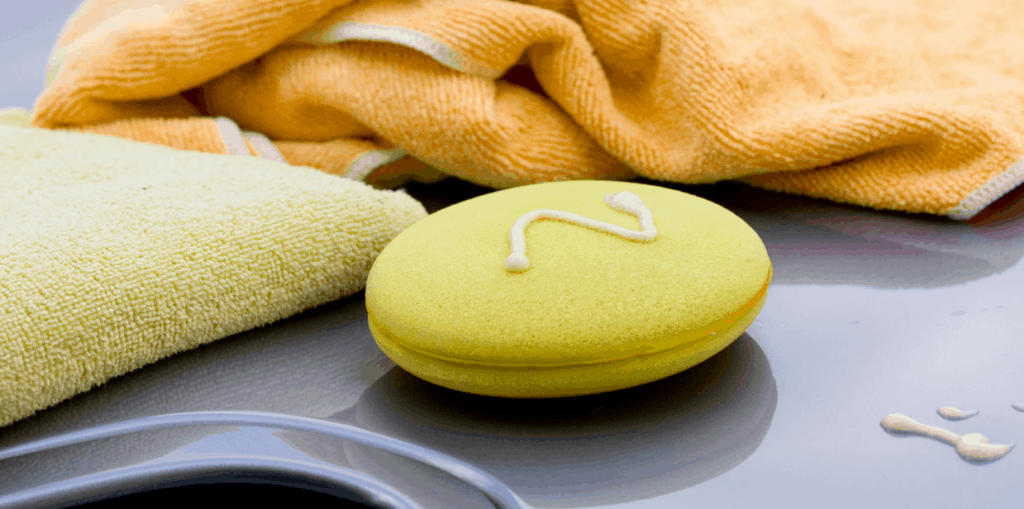
In the beginning, there was carnauba wax, a natural-occurring product that is derived from palm trees grown in Brazil. Car Wax is designed to provide protection against exposure to UV rays, contaminants, and other debris. Polish helps to improve the luster or shine of the clear coating.
- Car wax provides car owners with several advantages.
- It's easy to use
- Cheaper than other products
- Simple to maintain and store
- You can combine it with polishes and other paint sealants
- Easier to remove
However, there are some areas of concern to consider.
- Doesn't last very long
- Traps dirt and debris
- Not good at protecting against chemicals
- Only lasts a few weeks
Paint Sealant – About $60 Per Year

Paint sealant is basically a synthetic car wax on steroids. It is applied the same way but tends to provide up to six months of protection. There are some advanced formula's that can last a year.
Paint sealant is a synthetically engineered liquid product that has been lab-created to adhere to the paint clear coat and provide a thin layer of protection. It's usually a combination of 'wax' and polish.
Some of the top benefits of using a paint sealant to keep your clear coat protected include:
- Is easy to apply
- Works well with car wax and polish
- Makes the car appear glassy and wet
Although paint sealants can last up to six months, they also come with some negative features:
- Shows paint imperfections
- Requires more prep work than wax
- Difficult to remove
- Provides a medium level of paint protection
Paint Protection Film or PPF – Up to a Few Thousand Dollars
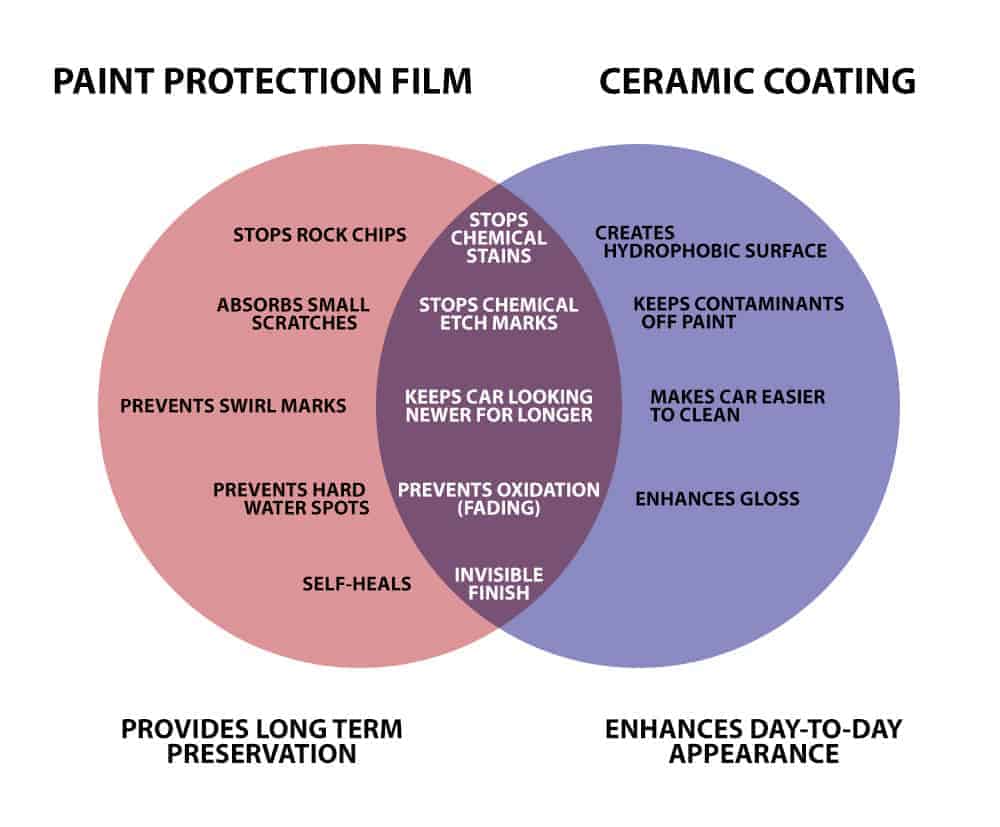
Paint Protection Film or PPF as we'll call it going forward is the upper echelon is paint protection products. It's a space-age technology product that was initially invented by PPG and used to protect helicopter blades from damage during the Vietnam War. It evolved from those early days into an exceptional protection product.
PPF is a thin vinyl product that is clear and installed on the vehicle's surface. Most car owners will apply PPF on the front bumper, hood, side-view mirrors, and other front area sections that tend to be hit by debris. Some folks will apply it on the entire vehicle.
The paint protection film is installed by a professional detailer or an automotive vinyl expert. When it's applied correctly and maintained, it offers consumers multiple benefits:
- Exceptional protection against rock chips
- Incredible self-healing properties
- Virtually scratch-proof
- Can last for 10 years
PPF is a great paint protection product, but there are some things you should consider before making the investment. Oh, and here is a bit of clarification – IT'S NOT FOR ALL PPF PRODUCTS.
There are some that are higher quality than others, so these CONS are for the cheaply made products still in circulation in some countries.
- PPF is the most expensive paint sealant or protection option as they are typically applied by professionals, and the cost of goods is higher due to the advanced technology and longevity.
- Not as hydrophobic as Ceramic Coatings. While many new PPF products have improved recently with hydrophobic properties, they are not as good as ceramic coatings. This is why many professional PPF installers recommend applying a quality ceramic coating on top of the PPF for better results (and usually offer this service).
- When damaged, requires replacement.
- Some cheaply made PPF's can still discolor. Yeah, there are still some really crappy made PPF products made, that can discolor over time due to excessive exposure to UV rays or contaminants. WHILE THIS IS VERY RARE it's still possible. So, make sure to buy a high-quality PPF to avoid this potential.
What Do You Need to Consider Before Doing Ceramic Coating Yourself?
If you're about 90% ready to purchase a high-quality DIY ceramic coating kit, there are a few important items to consider, that will help you reduce mistakes, and produce quality results.
First – Make Sure Your Paint is in Good Condition
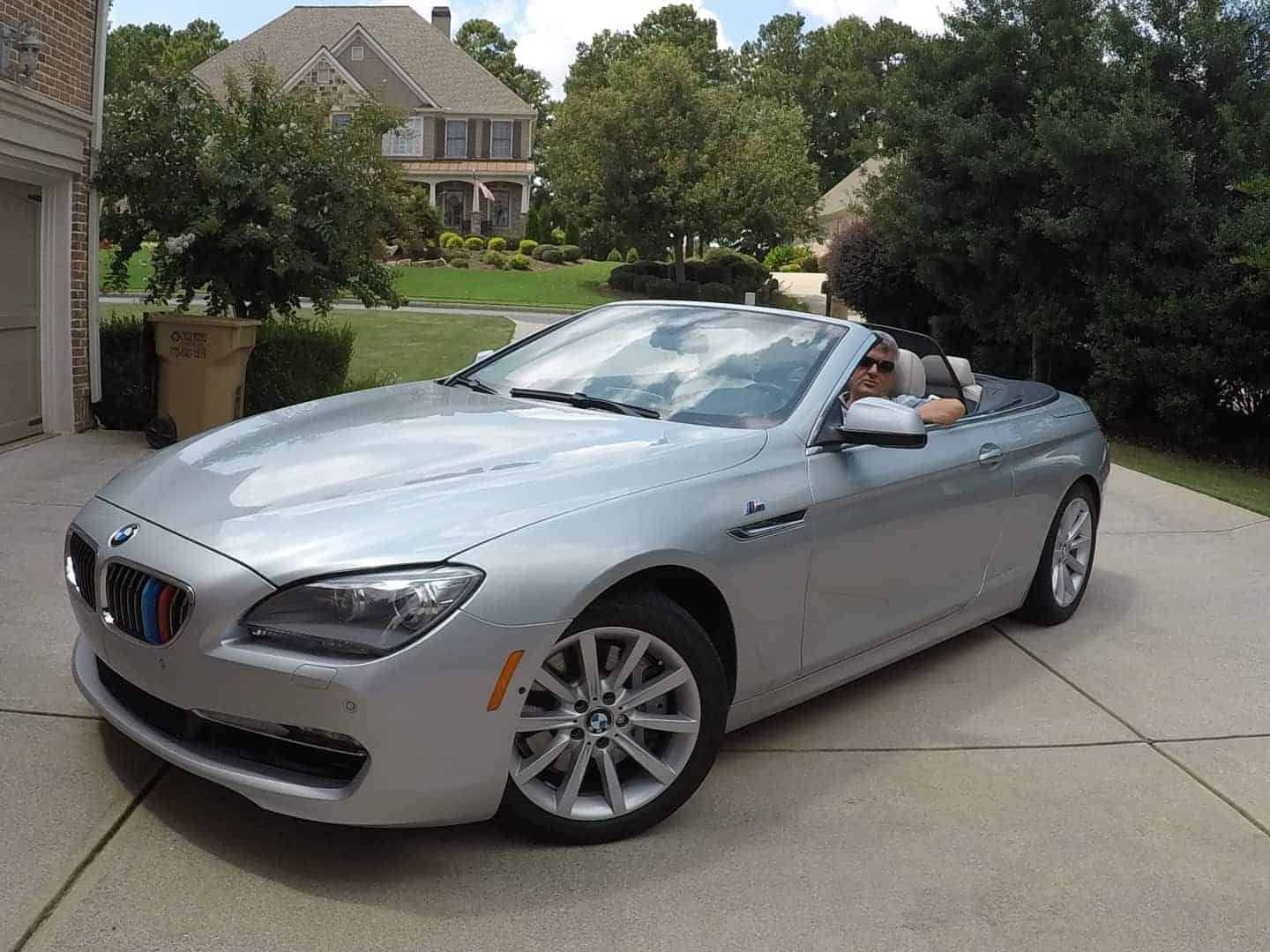
The quality of paint makes a huge difference when applying a ceramic coating. Anytime you are planning to invest in a nanoceramic coating product, it's important to start with examining the current condition of the paint.
A common myth about ceramic coatings is they improve the quality of paint. This just isn't true. In fact, when there is paint damage like swirl marks, scratches, faded paint, and stains caused by bird shit and bug guts, the coating will amplify these imperfections – not hide them.
That being said, if you have damage to the paint, you should either have paint correction completed by a professional detailer, do it yourself, or consider a new paint job or new vehicle.
We wrote a really detailed article about DIY paint correction, which we highly recommend reading if you're considering doing this yourself. Once you have, determine if you feel comfortable doing this yourself. Otherwise, start looking for a local professional car detailer or auto detailing company who can handle this for you.
Second – Consider your Paint Protection Options
When the paint is in good condition, you'll need to consider all of your paint protection options. While we strongly believe that ceramic coatings like our Armor Shield IX is a great deal, it is not for everyone.
Before you spend money on any paint protection method, complete the research needed to ensure you're making a smart investment. Weigh the pros and cons of each one, along with the financial and time investment needed to successfully apply and maintain each.
We wrote a detailed article comparing all four of the common paint protection options for you to review.
Third – Consider the Different Types of Ceramic Coatings
By now, you've either determined to go full throttle into the ceramic coating game, or you're going to choose paint sealants, car wax or a PPF. If you've made the coating decision, awesome! We think you're making a good choice.
However, there are several types of ceramic coatings out there.
Professional Coatings
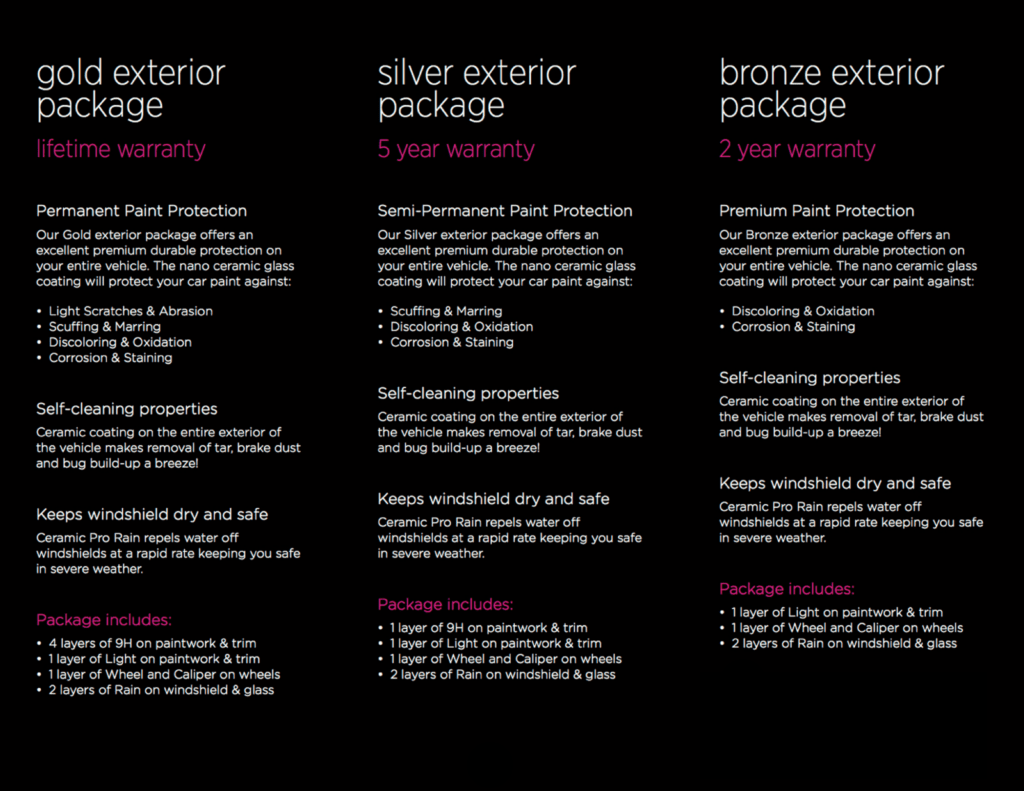
Ceramic pro products will run you anywhere from $500 to $3,000. However, this is just for the coating itself. Most of the time, pro coated products require paint correction to honor warranties – and of course, to be completed in-house. While they tend to last a long time with exceptional results, always consider the financial pinch associated with this option.
DIY Ceramic Coating
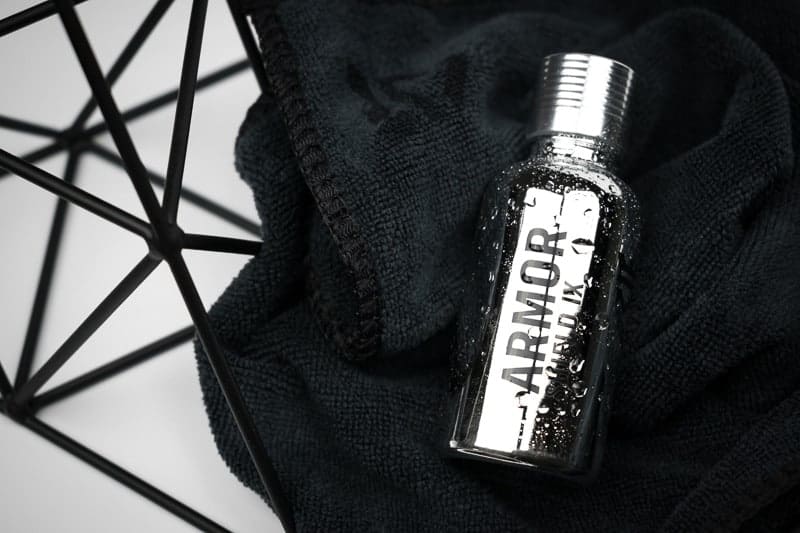
The other option is the do-it-yourself ceramic coating. The main difference between DIY and pro-grade stuff is that the DIY coatings are specially formulated for easier application. I would recommend reading more about these two products, to help you understand all the variables involved. This article is quite helpful when choosing between professional ceramic coatings and DIY ceramic coatings.
Fourth – Complete a Cost Analysis

If money wasn't a consideration, I'm certain we'd all be driving around in Bugatti's with full custom paint jobs, vinyl wraps, or PPF that is covered in ceramic coating. However, money is always a factor. This is why the next item to consider when you're thinking about a ceramic coating is weighing the cost.
I wrote a rather in-depth article breaking down all of these factors including cost, which you should read. Click this link to break down the true cost of ceramic coatings.
What Are the Best Ceramic Coating Kits?
Avalon King Armor Shield IX Ceramic Coating HONEST Review | How-To
There are several ceramic coating DIY kits on the market. Some of them good – some meh, and some that flat out just doesn't cut the mustard. However, pound for pound, and according to consumer reviews, and that from professionals in the industry, Armor Shield IX is among the best ceramic coating kits available.
But what makes Armor Shield IX so much better than others? Well, there are several reasons why our DIY nanoceramic coating kit is head and shoulders ahead of the competition.
The Quality of the Product

We mentioned above that the best DIY ceramic coatings are slightly revised versions of professional-grade coatings. They are designed for an easier application while producing similar longevity and paint protection results.
This is what we did with Armor Shield IX's formulation. Our DIY ceramic coating contains a SiO2 percentage of slightly more than 80%. But, it's not too quartz-rich to make it difficult to install.
In fact, according to many consumers and professional detailers, Armor Shield IX is one of the strongest ceramic coatings available on the market today – even compared with some pro-grade products.
User-Friendly
How to DIY a $3000 SUPERCAR Detail ft. My Corvette + AWESOME GIVEAWAY!
While strength and the quality of the product are essential for superior protection, if it's hard to apply for DIYers, it's a waste of time and money. Armor Shield IX was developed to empower the average car consumer to apply a professional, high-quality ceramic coating themselves, without needing a Master's Degree in Engineering or automotive technology.
We formulated this DIY nanocoating to be easy to apply and maintain. In fact, the hardest part about applying Armor Shield IX usually breaks down to the prep work. The video above does a great job showing how user-friendly our product is to apply and use.
What's in the DIY Ceramic Coating Kit
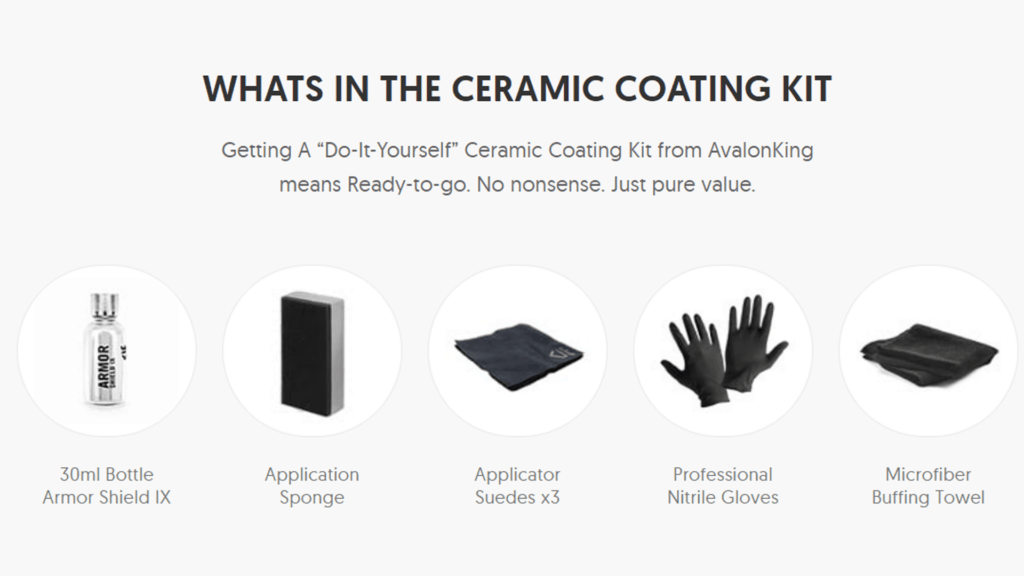
Product quality, user-friendly installation and use are important factors for choosing the best DIY nano quartz coating. However, if you don't have the right supplies needed to complete the task, it's pretty much pointless – right?
The Armor Shield IX consumer kit comes with EVERYTHING you need to correctly apply the product.
- (1) 30ml bottle of Armor Shield IX Ceramic Coating (This is enough for the average-sized car or motorcycles) 2 bottles are needed for sedans and crossovers, while 3 should take care of full-sized trucks and SUV easily.
- Application Sponge – this provides a strong yet flexible flat surface for smooth and consistent application (even on rounded corners).
- Applicator Suedes – you'll wrap the suedes around the sponge, then apply the coating on the suede for application. You should change out the suedes if the coating gets 'hard' on the surface, which is why we include (3) per kit.
- Professional Nitrile Gloves – Armor Shield IX isn't hazardous to your health. But we don't want you to get sticky stuff on your hands.
- Microfiber Buffing Towel – after you apply the coating, you need to buff it off. The high-quality microfiber buffing towel is perfect for accomplishing this crucial vital step.
Customer Support

Any time you are using something new, it's important to have a reliable source to ask questions and seek advice. That's the name of the game here at AvalonKing. Our customer service game is strong. In fact, it's one of our biggest differentials that elevates us from our competition.
We not only provide detailed, illustrated instructions in each Armor Shield IX ceramic coating kit, but when customers ask us questions – we're quick to reply. Simply review the comments from REAL CUSTOMERS on our product page.
Additionally, our social media engagement game is on-point. When you have questions or concerns addressed through any platform, we're here to provide factual data and answers you need.
Two Year Warranty
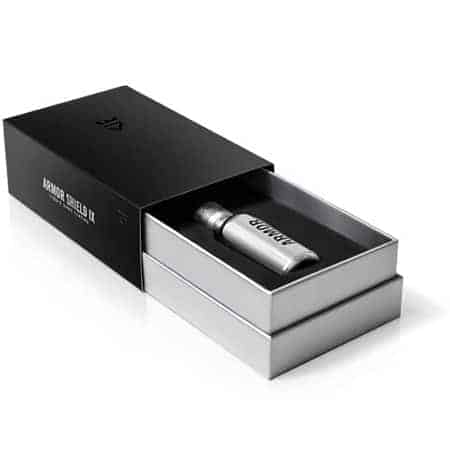
We believe in the quality of our product. In fact, we stand by this by offering a two-year expected longevity warranty – something our DIY coating competition simply doesn't offer. We also offer a 30-day easy return (in case you have buyer's remorse or second thoughts), and ONLY sell our product through our safe and secure online shopping platform.
When you break it down simply, a ceramic coating on your car is definitely worth it. If you have any questions about the information posted in this article, or about ceramic coatings for DIY consumers, comment below, or contact us directly.
If you enjoyed this article, then you'll love AvalonKing's automotive care products for Do-It-Yourselfers. We create "No B.S. products" for an affordable price. And the best part, we treat our customers like family, so if you have any questions or just looking to chat about cars, we're only an email or call away. Check out our homepage here.
How Much Does It Cost to Ceramic Wrap a Car
Source: https://avalonking.com/blog/cost-of-ceramic-coating-on-your-car-is-it-worth-it/
0 Response to "How Much Does It Cost to Ceramic Wrap a Car"
Post a Comment